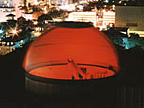|
|
Activities for Credit
Activities for Participation Credit
Participation credit may be earned through various activities and assignments, both in class and outside of class.
These credits are added to your overall quiz score (the total of the best three quizzes for the semester), up to a
maximum of 20 points, which constitutes 20% of the total course grade. There are several kinds of activities for credit,
explained below.
In-Class Participation
 |
 |
 |


Star Parties

One way to earn additional credit is to attend a Wednesday, Friday, or Saturday night star
party, as explained below. Star parties are scheduled weekly, when skies are clear.
Remember to collect the host's signature.
Star Party details
|
|
 |
|
We have a number of in-class activities consisting of writing answers to various questions on an index card. Most of these
are individual activities in a standard format that asks you to list the main points of the lecture that day, the concepts
you still find muddy, and your opinion about the pace of the class (I call this the "3-Minute Paper" or "Main and Muddiest").
Completing the card earns you 1 automatic point for participation. Occasionally I will ask a more involved or extensive
question to be addressed by small groups of students, who together turn in a single index card. Index card activities
will occur approximately once a week.
Star Parties
The Astronomy program at UT offers public viewing through telescopes several evenings per week. The ones on
Wednesday nights are designed for students taking undergraduate astronomy classes and are held on the roof of
RLM, using a 16-inch telescope. There are also star parties at Painter Hall on Friday and Saturday nights, open to the
entire UT community and to the general public. Until late October, all the star parties begin at 8:00 PM; after the change
back from Daylight Savings Time, the starting times will shift. In addition, star parties are cancelled if it is raining or too
cloudy to see anything. You can look up the
details and phone numbers to call to find out whether
the star parties are cancelled on the Astronomy web pages.
Important note: If you want to receive credit for a star party, you must get a signed yellow slip from the person operating
the telescope (a member of the Astronomy Department) and turn it in, in class, within 1 week of the Star Party. Also, you
can only count up to 2 star parties for participation credit in Ast 309N over the whole semester.
Special Lectures
From time to time, there may be a special public lecture on a topic relevant to this course. A good example was the talk
on Extrasolar Planets by Dr. Bill Cochran during Natural Sciences Council week. You have the option of attending such
talks, and turning in a written (paper copy) essay about what you heard and learned, for up to 1 point of participation credit.
Most likely I will not know about such opportunities far in advance, but when I hear of an appropriate event, I will announce
it in class and post an announcement on the class web page.
Relevant Articles
For those who are unable to attend evening events such as star parties or special lectures, you may find an article in a
newspaper, magazine, or authoritative web-site on a topic relevant to this course, and write a short essay about it.
The essay needs to be turned in on paper, and there will be a cut-off towards the end of semester when such essays
are due. As with the special lectures, the essays will be graded and assigned credit (can be 1 point, 1/2 point, or
0 points if the item is not suitable or your write-up indicates a serious lack of understanding of the material). Note:
The professor is the final judge on whether an article is suitable (it has to be both relevant and from a reliable source.
You can turn in a maximum of three such articles over the semester to count towards participation credit.
Group Activity, Sep. 10 - answers
[
pdf
]
Activity, Sep. 13 - summary
[
pdf
]
Activity, Sep. 20 - summary
[
pdf
]
Activity, Sep. 27 - summary
[
pdf
]
Activity, Oct. 18 - summary
[
pdf
]
Activity, Oct. 29 - answers
[
pdf
]
Activity, Nov. 5 - summary
[
pdf
]
Activity, Nov. 19 - summary
[
pdf
]
Activity, Nov. 22 - summary
[
pdf
]
|
|

